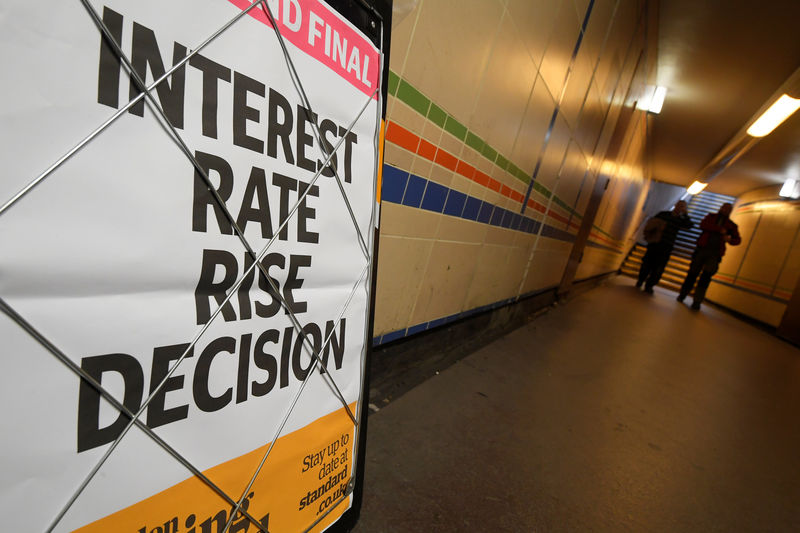 © Reuters. A newspaper advertising board heralds the Bank of England’s decision to raise in interest in central London
© Reuters. A newspaper advertising board heralds the Bank of England’s decision to raise in interest in central LondonBy Emma Rumney and Andrew MacAskill
LONDON (Reuters) – For prospective first-time British home buyer Abby Hall and thousands of others like her, the Bank of England’s decision to raise interest rates on Thursday may just have made things a little tougher.
“We are about to buy a house, so we were hoping it wouldn’t happen,” 36-year-old Hall, a travel manager, said as she pushed her baby along in a pram in Greenwich in southeast London.
“It’s a bit of a difficult time for people trying to get on the housing ladder anyway without it becoming a bit harder.”
The BoE said it did not expect the increase in its benchmark rate to 0.50 percent from an all-time low of 0.25 percent to hit the budgets of borrowers hard, given how low rates remain by historical standards.
But the psychological impact of the first interest rate rise in more than a decade may be hard to measure.
Young people already spend a three times greater proportion of their income on housing than their grandparents, and they often live in poorer accommodation, according to a study published by the Resolution Foundation research group in September.
Home ownership in England has fallen to its lowest level in 30 years fueled by the growing gap between earnings and property prices.
The BoE said a third of households in Britain have a mortgage. It said that initially the impact of the rate hike will be fairly modest although around 2 million households in Britain with mortgages were now facing their first ever interest rate hike.
The central bank said that if its 25 basis-point rate hike is fully passed on, it would raise the average cost of a mortgage by only around 15 pounds ($20) a month.
What remains to be seen is how households respond to what is likely to be the start of a series of rate hikes in Britain, even if the BoE stressed that it would move only gradually and that rates were unlikely to return to their levels of around 5 percent seen before the 2007-09 financial crisis.
“The Bank of England’s decision to raise interest rate to 0.5 percent may appear subtle at first glance, but it will undoubtedly send a very real signal to UK shoppers and retailers,” Paul Martin, UK head of retail at KPMG, said.
“This rise marks the first hike in 10 years, and there is therefore a sizeable portion of shoppers who have become all too accustomed to cheap credit.”
James Ronen, 38, who builds drones and has a mortgage, said the rate rise will be a shock for many first-time buyers.
“It’s going to really squeeze people,” he said. “For a lot of first-time buyers, this is the first rate rise they’ve seen so that might be a bit of a surprise for them.”
On the other hand, pensioners whose disposable incomes are growing at a faster rate than for people of working age in Britain will be among the biggest winners, especially as they tend to have savings, which earn more when interest rates rise.
Last year, British Prime Minister Theresa May sided with voters who have long complained that they were being punished by the dwindling returns on their savings in order to help borrowers cope with debt costs.
May’s spokesman said on Thursday that she expected to see commercial banks pass on higher returns to savers quickly following the BoE’s decision.
Martin Wooley, 77, who has no mortgage and just savings, welcomed the Bank of England news.
“We have been starved of decent interest rates on our savings for a very long time now. It’s high time it went up – and a lot more than this,” he said. “I hope they will do a great deal more before too long.”
($1 = 0.7662 pounds)
Source: Investing.com




























